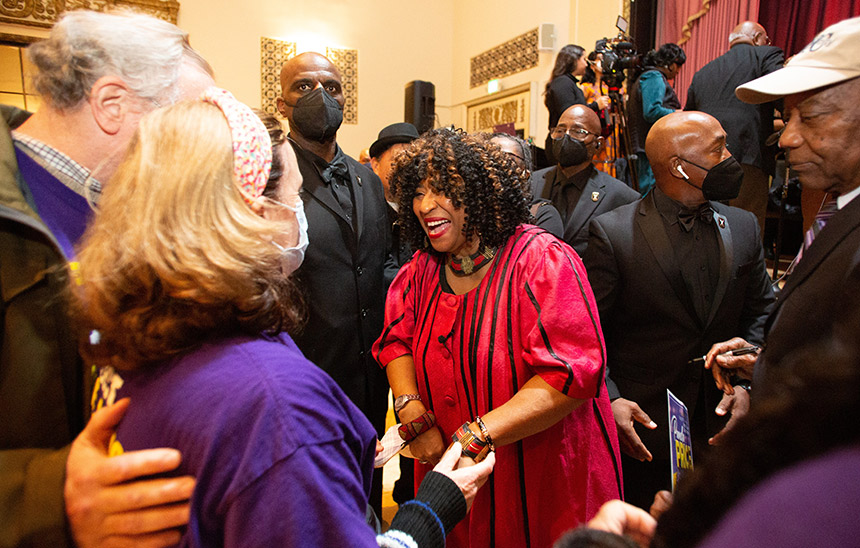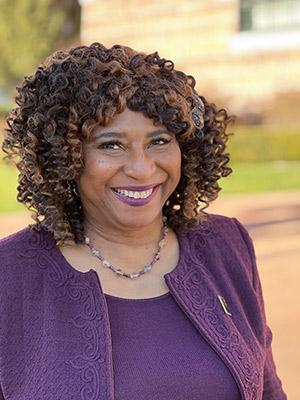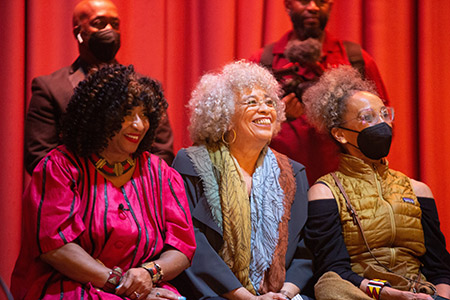
By Andrew Cohen
Becoming Alameda County’s first Black district attorney in the 170-year history of the position is no small feat. But for Pamela Price ’82, reforming the county’s approach to criminal justice would be a greater achievement.
An office outsider who was elected in November and began her new job in January, Price seeks to reduce gun violence and mass incarceration while rooting out racial, socioeconomic, and gender disparities within the county’s criminal legal system.
Having lived in Ohio’s juvenile justice and foster care systems, Price took a unique path to Yale and Berkeley Law. She started her career as a criminal defense attorney in San Francisco, then opened her own firm in Oakland in 1991 — specializing in employment litigation and representing victims of retaliation, wrongful termination, sexual assaults, and discrimination based on sex, age, religion, disability, and race.
The recipient of over 20 awards for her social justice work, community activism, and other public service, Price now takes aim at the biggest challenge of her legal career. She recently answered questions about her goals as DA and the obstacles to reaching them.
Q: What are you most excited about as you begin your position as DA, and how would you describe your first month-plus on the job?
Price: I am most excited about the opportunity to reset the relationships the DA has with our community — including our constituents, people impacted by the system, our local law enforcement agencies, elected officials, and our business community — and the changes that we will make in how justice is administered in Alameda County.
My first month was very challenging, primarily because of the lack of cooperation from the previous administration. Our first month would have been much easier if basic information had been appropriately shared with our team. Additionally, we were stunned by the amount of “fixing” we have to do just to operate a modern law office. The lines of authority and accountability are incredibly frayed. There are people on the payroll we are still trying to figure out what they actually do, contracts for hundreds of thousands of dollars that were not approved by the Board of Supervisors, attempts to sabotage our work and roadblocks that prevented my leadership team from being added to the county payroll for a whole month. There is more than I can tell you.
Q: You’re the first person in nearly a century to take on this role without having worked in the county DA’s Office. What challenges does that present?
Price: There was a steep learning curve in knowing all the unusual ins and outs of how my predecessor created HR policies, grant funding and reporting, and the invisible lines of communications. The office did not have the technology to even work from home until right before COVID — so to say systems are antiquated is an understatement. One simple example is when I came into the office, I did not have the ability or access to send an all-employee email. Only one person had the ability to do so, and she had stopped coming to work. We found pockets of employees who were unaware that their supervisor no longer worked in their department or even in the DA’s office. The office lacked onboarding protocols, a training budget, a transition plan, or even an accurate organizational chart. All of this my leadership team and I have worked to correct.
Q: After losing the DA election in 2018, what campaign changes do you think made you a stronger candidate and what other factors helped your message resonate better with voters?

Price: In 2018, I was the first person to run against an incumbent DA since 1972. It was the first time most people even knew that the DA is an elected official. I ran on a platform that was the opposite of my predecessor and a viewpoint relatively new to the voter base. In 2022, people remembered what I stood for in 2018.
In the four years between 2018 and 2022, we had a national spotlight on police misconduct and a conversation, for the very first time, about how the DA has the power to hold police accountable. With George Floyd’s murder in May 2020, you saw the Attorney General step in and charge the officers. In Ahmaud Arbery’s murder in February 2020, we saw the DA bury the case and then his family stepped forward and forced accountability.
So the major external factors that helped my message resonate better with voters was the conversation about police misconduct and the racial reckoning about how Black people in this country are targeted by law enforcement. My campaign grew stronger in 2022 because we were able to build on our experience from 2018 and run a campaign and win across the entire county.
Q: What are your main goals as DA, and what do you see as the county’s most urgent priorities?
Price: My 10-point platform continues to guide me in how we transform the DA’s office over the next six years. It is going to take hard and smart work to right the ship. I remain dedicated to addressing gun violence, mental health issues and gender-based crimes, as well as a new vision for youth justice. Our office will work to educate our community on the role of the DA in addressing those issues as well as hate crimes, consumer, environmental, and worker protections, public accountability, racial justice, and ways to implement innovation in the criminal justice system. Key to reaching these goals will be community engagement, addressing the root causes of crime and initiatives, and programs to create public safety and violence prevention. However, this system was not broken overnight and it will not be fixed overnight.
Q: You’ve said we’re living with a criminal justice system from the 1940s. What are the most egregious facets of that?
Price: The most egregious facet of the legacy from the 1940s are the racial attitudes that have infected the system. It is shocking for far too many people, including Black people, to have a Black woman in charge of the DA’s office, supported by a diverse team that includes powerful Black lawyers. The New Jim Crow that Michelle Alexander wrote about is real and is reflected throughout the criminal justice system. Our DA’s office is filled with legacy DAs, based on a hiring system that preferred the children of judges or former DAs, and was traditionally a pipeline to the judiciary. What we see every day is one set of rules and expectations for Black and Brown people, and another set for Whites.
Q: The work to dismantle systemic racism in the legal system, end mass incarceration, and stop the over-policing of ethnic minority communities is likely a long road. How will you measure success over the next six years?
Price: No question, there is a lot of work to be done. Dismantling a system begins with just one step. Obviously, change won’t happen overnight, but small steps will contribute to making changes here and there over the course of six years. In my first month in office alone, we created the Public Accountability Unit and the Mental Health Commission, with volunteer members of the community, and began to realign our collaborative and mental health courts to make them more responsive to the needs of the community. The Public Accountability Unit is tasked with holding law enforcement and public officials accountable for misconduct, and we reopened eight officer-involved shootings and in-custody deaths to give them further review. These are tangible steps to protect public safety by advancing justice.
I will measure success by how far we move toward recognizing the lack of cognitive development of youth under the age of 25 and creating better accountability measures for youthful offenders, how we improve our response to people suffering from severe mental illness and/or experiencing mental health challenges, how well we implement the new Racial Justice Act, and how we create more robust services for victims of crime, including restorative justice opportunities.
Q: While studies show that excessively punitive measures haven’t reduced crime, some alternatives are untested on a large scale. How do you go about creating new strategies and programs and getting buy-in on them?
Price: As a new administration, we have the opportunity to assess and grow from the failed strategies and programs and share better alternatives with our justice partners. We can really look at existing programs and see how we, from the prosecutor’s perspective, can make them better. Are there people who should be receiving services that don’t already? What would new collaborative courts look like? I think the most important “buy-in” in this case would come from the defendants themselves. They need to commit to making changes in their lives, especially if they’re given these second chances or alternative programs.

I’m also committed to ensuring that victims and their families are informed about potential changes that may affect a case. Although they may not always agree with the decisions we make, we want to keep them informed and explain the reasoning for such decisions. The impact of our decisions on their lives is a major consideration in how we administer justice. We are working very collaboratively with survivors and victims of crime to ensure that their voices are heard and their needs are met.
Q: What did it mean to you becoming Alameda County’s first ever Black DA, and is there any sense of added pressure from that?
Price: I am tremendously honored to be the first Black woman to sit in this seat and to be trusted by the residents of Alameda County to eradicate racism in our criminal justice system and to do justice. As a young woman, I became involved in the Civil Rights movement following the assassination of Dr. King because I saw teenagers like me marching, getting beaten by police, standing up for racial justice, and demanding change. All the things that we saw on the news in the 1960s were terrifying for a young person. It had a lasting impact on me and shaped who I am today. I recognize that being in this position is historical and I know that I am exactly where I am supposed to be in this season. I hope that my example will inspire others to run for office.
Q: How did your time at Berkeley Law shape your values and career path, and what was the most meaningful aspect of your time here?
Price: I spent four years at Berkeley because I completed the joint degree Jurisprudence & Social Policy Program. It was an important time for me as an activist — being here gave me the freedom to get involved in the community and reaffirmed my vision of the law as a tool for social change. I still remember the charge that “all progress depends on the unreasonable man” that I learned at Berkeley Law. Having a degree from such a distinguished law school has stood the test of time over the four decades of my career. The JSP program gave me the time and the opportunity to think about the law from a broader perspective.
Q: What advice would you give prospective and current law students who are eager to help transform the criminal legal system?
Price: Get involved in your local community and get educated. There is so much information and jurisprudence in the world today about how we got here, how the prison-industrial complex and the profit motive has shaped and twisted our criminal justice system, our governance systems at the local level, and served to maintain the structures of racial injustice. We need strong, powerful leaders to challenge the status quo and knowledge is power. Connect with people who are directly impacted by the system and work to amplify and empower their voices as much as your own.